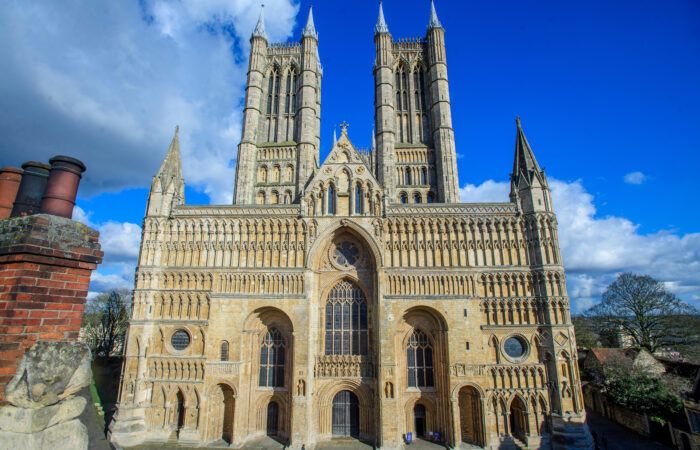A talk by the Canon Chancellor, the Reverend Canon Dr Mark Hocknull, first given in Lincoln Cathedral on Sunday 26 March 2017.
Die Politik ist die Lehre vom Möglichen. So said Otto von Bismarck, the German Chancellor of the 19th century responsible for the unification of Germany. The phrase is usually translated as “Politics is the art of the possible,” translating the German word Die Lehre as the art. The word really means teaching, as in a body of thought rather than the act of helping someone to learn. So we could translate it legitimately as doctrine. So a legitimate translation of Bismarck might be Politics is the doctrine of the possible. In other words, politics is all about getting things done. Never mind the niceties of sticking firmly to principles and standing up for truth. What matters in the real world is getting things done. Of necessity, politicians live in the morally ambiguous world of trade-off and compromise. I don’t mean to cast aspirations here on the motives of politicians, for the compromises that politics entails can be, & are, undertaken from good motives and the desire to achieve good things.
Bismarck made the saying in an interview with a journalist by the name of Friedrich Meyer. The full sentence is Politics is the art of the possible, the attainable – the art of the next best. If we see politics in this way, it casts the age old question of whether religion in general, or Christianity in particular, should have anything to do with politics in a very different light. It is a question I think that has been given fresh urgency in the light of events outside Westminster this week. The more so in fact when we consider that Bismarck felt that the second best of politics was not good enough and that really what was needed to achieve political goals was force. Something the Iron Chancellor had no hesitation in doing.
There is a very widely held view that religion is a very personal thing. It’s about my relationship with God and my personal private beliefs and morality. Whereas politics is about the public world. The two things are separate and distinct. Religion, faith, is about personal transformation. This view has its own integrity and it captures something of the truth of the Christian faith. The trouble is that it has little room for the things that make up much of our lives: management, economics, international affairs, the workplace, leisure, the arts and sciences. My worry about conceiving faith like this is that the withdrawal of faith from the public realm is itself a political act with potentially disastrous consequences. Either it fails to challenge the status quo or it leaves the public realm open for occupation by forces which may well be oppressive and evil.
Even worse is the unwitting cooperation of religion with such oppressive and evil forces. Here it is that the trial of Jesus before Pilate is instructive and points to a different understanding of the kind of politics that faith call us to enact. The trial before Pilate is an enormously political act. If Bismarck and Pontius Pilate represent the politics of power, Jesus represents an altogether different kind of politics; the politics of love.
Early in the morning, a time no doubt chosen to avoid publicity, Jesus is led from the High Priest’s house to Pilate’s official residence. The collusion between religion and power begins as Caiaphas unfolds his plan to avoid national disaster at the cost of one man’s life. John tells us that the Jewish leaders did not enter the house because they did not wish to defile themselves and so be prevented from eating the Passover meal. There is great irony here. In seeking to maintain their religious purity, they hand over the Lamb of God himself.
From a distance then, so as not to become involved they demand Jesus be put to death, even though when challenged by Pilate they can offer no crime which Jesus has committed. The attempt to separate religion from the grubby business of government and maintaining order has set up two confrontations between Pilate and Jesus. Pilate goes straight to the heart of the matter and asks Jesus outright if he is the King of the Jews. Unwittingly, he has opened himself up at his most vulnerable spot, and Jesus goes for the jugular as it were, pressing directly on Pilate’s weak spot. Jesus’ kingdom is not of this world. If it were his followers even now would have taken up arms and embraced the way of the world and fought to gain his release. Instead Jesus moves the conversation to a different level. Pilate says he is a king, but Jesus sees kingship, sees politics in a different way to Pilate and to the Jewish leaders. Jesus has come to bear witness to the truth. But Pilate cannot allow himself to embrace the concept. He has spent his life working in the realm of compromise and expediency, and so dismisses the claim with a sneer and cynical laugh and the words ‘what is truth?’
How are we to see this new politics which witnesses to the truth? Pilate and the Jews are really playing the same game. Both are deploying the politics of power backed by force. But Jesus practices the politics of love. The writer of Ephesians reminds us that speaking the truth in love, we must grow up in every way into him who is the head, into Christ. Truth and love are inextricably linked together. John’s gospel is the gospel of love. The relationship of the Father to the world is one of love, the relationship of the Father and the Son is love. The relationship between Jesus and the disciples is love. He calls them friends, washes their feet and gives them a new commandment to love one another as Jesus has loved them. Jesus’ response to his enemies is one of non-violence.
Little wonder then Pilate is troubled. He begins to recognise that Jesus is innocent and makes an, albeit half-hearted, attempt to release him. Despite his attempts, the mob will not be satisfied with anything but the death penalty. Those who operate the politics of force cannot deal with the politics of love. Truth is sacrificed in consideration of mutual advantage and survival. The High Priests and Pilate alike think they have won. Caiaphas has averted a national disaster. Pilate has reinforced Rome’s dominion. Both alike have shown themselves to be Caesre’s friend. But from the Evangelist’s point of view things look very different. Both are guilty of shedding innocent blood. In judging Jesus, Pilate has himself been judged and found wanting.
The politics of love then entails speaking the truth to power. To be born from above or to be born again necessarily entails receiving power from on high to bear witness to truth in the face of compromise or darker worldly forces. It is necessarily to be a part of public political life. The politics of love leaves no institutions or political programmes of targets. Instead it judges and sifts all such institutions and programmes by the ultimate standard of truth underpinned by love.
Lent is a good time to take this challenge to heart It is a time to see more truthfully who we are in the story of the trial of Jesus. Are we like Caiaphas in our complicity with the powers that be in supressing truth and silencing those who bear witness to it? Are we like Pilate in the way we enjoy the trappings of power and status and give in to the demands of the crowd or our own group?
Or are we able to respond to the new commandment which Jesus gives to all that believe in him, that we love one another and he has loved us?
The Canon Chancellor will continue his series of Lent Talks at Evensong on each Sunday of Lent. Evensong on a Sunday begins at 3.45pm and is held in the Choir of Lincoln Cathedral.

